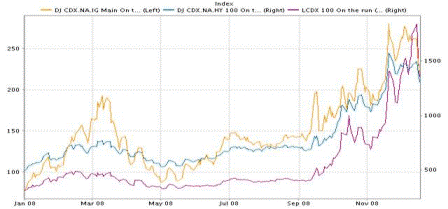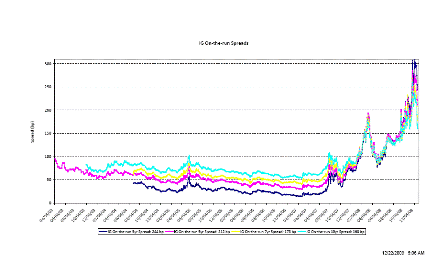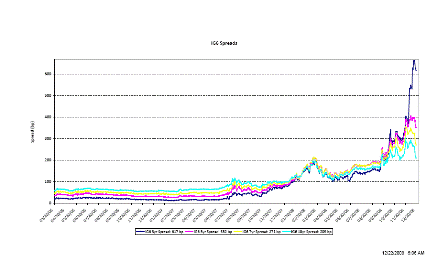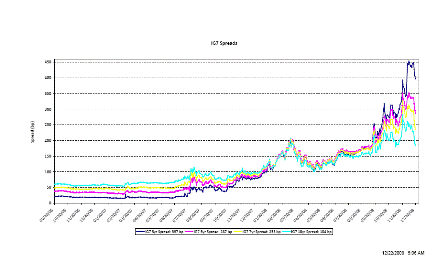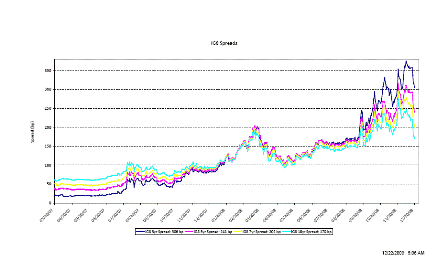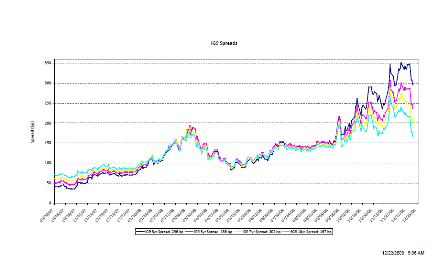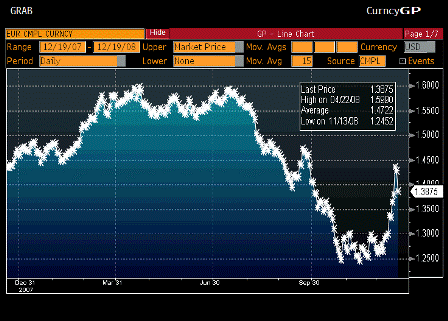The Seven Deadly Deficits
By Joseph E. Stiglitz
When President George W. Bush assumed office, most of those disgruntled about the stolen election contented themselves with this thought: Given our system of checks and balances, given the gridlock in Washington, how much damage could be done? Now we know: far more than the worst pessimists could have imagined. From the war in Iraq to the collapse of the credit markets, the financial losses are difficult to fathom. And behind those losses lie even greater missed opportunities.
Good start! Maybe going to get to the real costs and losses?
Put it all togetherâ€â€Âthe money squandered on the war,
Money squandered? That’s just spread sheet entries. The real cost was human endeavor squandered, real resources squandered, and, most important, lives cut short.
the money wasted on a housing pyramid scheme that impoverished the nation and enriched a few,
Again, money wasted. How about houses built? The real effect of that scheme was $1 million new houses built that may not have been built. That didn’t impoverish the nation. The impoverishment came when the government failed to sustain aggregate demand when the housing spending subsided and commodity boom was interrupted by a massive inventory liquidation.
and the money lost because of the recessionâ€â€Âand the gap between what we could have produced and what we did produce will easily exceed $1.5 trillion.
Yes, but it’s not the lost money. It’s the lost output and real personal losses due to unemployment.
Think what that kind of money could have done to provide health care for the uninsured, to improve our education system, to build green technology…The list is endless.
That could have been done and still could be done. It’s not like there is some finite pool of money that got used up. When there’s excess capacity, which there has been all along, it’s there to be used by a simple fiscal adjustment.
And the true cost of our missed opportunities is likely even greater. Consider the war: First there are the funds directly allocated to it by the government (an estimated $12 billion a month even according to the misleading accounting of the Bush administration). Much larger, as the Kennedy School’s Linda Bilmes and I documented in The Three Trillion Dollar War, are the indirect costs: the salaries not earned by those wounded or killed, the economic activity displaced (from, say, spending on American hospitals to spending on Nepalese security contractors). Such social and macroeconomic factors may account for more than $2 trillion of the war’s overall cost.
Again with the money as the ‘cost’ of the war. That’s just a matter of spread sheet entries. Those are nominal issues, not real issues as I listed above.
There is a silver lining in these clouds. If we can pull ourselves out of the malaise, if we can think more carefully and less ideologically about how to make our economy stronger and our society better, perhaps we can make progress in addressing some of our long-festering problems. As a road map for where to begin, consider the seven major shortfalls the Bush administration leaves behind.
THE VALUES DEFICIT: One of the strengths of America is its diversity, and there has always been a diversity of views even on our fundamental principlesâ€â€Âinnocent until proven guilty, the writ of habeas corpus, the rule of law. But (so we thought) those who disagreed with these principles were a fringe, easily ignored. We have now learned that the fringe is not so small and includes among its numbers the president and leaders of his party. And this division of values could not have come at a worse time. The realization that we may have less in common than we thought may make it difficult to solve the problems we must address together.
Good point.
THE CLIMATE DEFICIT: With the help of corporate accomplices such as ExxonMobil, Bush tried to persuade Americans that global warming was fiction. It is not, and even the administration has finally admitted as much. But for eight years we did nothing, and America pollutes more than everâ€â€Âa delay that will cost us dearly.
Ok, let’s see how this ties in with the rest of this piece.
THE EQUALITY DEFICIT: In the past, even if those at the bottom saw little or any of the gains from economic expansion, life was viewed as a fair lottery. Up-by-your-bootstraps stories are part of America’s sense of identity. But today, the promise of the Horatio Alger legend rings false. Upward mobility is becoming increasingly difficult. Growing divisions in income and wealth are reinforced by a tax code that rewards those who have lucked out in the globalization sweepstakes. As that realization sinks in, it will be even harder to find common cause.
The real problem is the failure to recognize that the labor markets are not a fair game. People need to work to eat, but business only hires if it sees a targeted return on equity. So the expected outcome is stagnation of real wages without some kind of support for workers.
THE ACCOUNTABILITY DEFICIT: The moguls of American finance justified their astronomical compensation by their ingenuity and the great benefits it supposedly bestowed upon the country.
The shareholders gave it to them, as a result of the institutional structure of corporate law.
Now the emperors have been shown to have no clothes. They did not know how to manage risk; rather, their actions exacerbated risk. Capital was not well allocated; hundreds of billions were misspent, a level of inefficiency much greater than what people typically attribute to government. Yet the moguls walked away with hundreds of millions of dollars while taxpayers, workers, and the economy as a whole were stuck with the tab.
And CEOs still earn just as much. The problem is the institutional structure/corporate law which hasn’t changed.
THE TRADE DEFICIT: Over the past decade, the nation has been borrowing massively abroadâ€â€Âsome $739 billion in 2007 alone.
No, this is backwards. The causation is that domestic credit funds foreign savings.
And it is easy to see why: With the government running up huge debts, and with Americans’ household savings close to zero, there was nowhere else to turn. America has been living on borrowed money and borrowed time, and the day of reckoning had to come. We used to lecture others about what good economic policy meant.
Yes, to our great advantage, as they believed that nonsense about exports being good and imports a bad, and they supported our real standard of living/real terms of trade by some $739 billion in 2007 alone.
Now they are laughing behind our backs, and even occasionally lecturing us. We’ve had to go begging to the sovereign wealth fundsâ€â€Â
We didn’t have to do that- we don’t need their money. Yet even this author thinks we did.
the excess wealth that other governments have accumulated and can invest outside their borders. We recoil at the idea of our government running a bank. But we seem to accept the notion of foreign governments owning a major share in some of our iconic American banks, institutions that are critical to our economy. (So critical, in fact, we have given the Treasury a blank check to bail them out.)
Why do we care who the bank shareholders are? Is there some national security issue here? Of course not.
THE BUDGET DEFICIT: Thanks in part to runaway military spending, in just eight short years our national debt has increased by two-thirds, from $5.7 trillion to more than $9.5 trillion.
Obviously not nearly enough, as per the current severe shortage of aggregate demand.
But as dramatic as they are, these numbers vastly understate the problem. Many of the Iraq War bills, including the cost of benefits for injured veterans, have not yet come due, and they could amount to more than $600 billion. The federal deficit this year is likely to add up to another half-trillion to the nation’s debt. And all this is before the Social Security and Medicare bills for the baby boomers.
Hopefully that will be sufficient to sustain demand at full employment levels. But probably not. The demand leakages are very large and require near equal deficits to offset to sustain output and employment.
THE INVESTMENT DEFICIT: Government accounting is different from that in the private sector. A firm that borrows to make a good investment will see its balance sheet improved, and its leaders will be applauded. But in the public sector there is no balance sheet, and as a result, too many of us focus too narrowly on the deficit.
Agreed!!!
In reality, wise government investments yield returns far higher than the interest rate the government pays on its debt;
Ok, but not that it matters.
in the long run, investments help reduce deficits.
Huh? What is that a good thing? It’s what they do for output and employment that matters.
To cut them is penny-wise but pound-foolish, as New Orleans’ levees and Minneapolis’ bridge attest.
Agreed!!!!
THERE ARE TWO hypotheses (besides simple incompetence) about why Republicans paid so little attention to the growing budget shortfall. The first is that they simply trusted in supply-side economicsâ€â€Âbelieving that, somehow, the economy would grow so much better with lower taxes that deficits would be ephemeral. That notion has been shown for the fantasy that it is.
Kind of what happened- the growing economy shrunk the deficit until it got too small to support the credit structure.
The second theory is that by letting the budget deficit balloon, Bush and his allies hoped to force a reduction in the size of government. Indeed, the fiscal situation has grown so scary
Scary? Meaning scary large? Even by mainstream standards, it’s only maybe 4% of GDP annually and maybe 45% of GDP in total. Far less than most of the other G7 nations of the world.
The problem is it’s scary small, as evidenced by the falling output and employment.
that many responsible Democrats are now playing into the hands of these “starve the beast” Republicans and calling for drastic cuts in expenditures. But with Democrats worrying about appearing soft on securityâ€â€Âand therefore treating the military budget as sacrosanctâ€â€Âit is hard to cut spending without slashing the investments most important to solving the crisis.
The most urgent task for the new president will be to restore the economy’s strength. Given our national debt, it is especially important to do that in ways that maximize the bang for our buck
Not relevant. The idea is to restore output and employment. Doesn’t matter what number gets entered into the spread sheet.
and help address at least one of the major deficits.
Wrong- we will instead benefit if they get larger.
Tax cuts workâ€â€Âif they workâ€â€Âby increasing consumption, but America’s problem is that we have been on a consumption binge; prolonging that binge just postpones dealing with the deeper problems.
Huh? The entire point of the economy is real consumption.
States and localities are about to face real budget constraints as tax revenues plummet, and unless something is done, they will be forced to cut spending, deepening the downturn.
Yes, I’ve called for immediate federal revenue sharing for the states of $300 billion on a per capita basis with no strings attached.
At the federal level, we need to spend more, not less. The economy must be reconfigured to reflect new realitiesâ€â€Âincluding global warming. We will need fast trains and more efficient power plants. Such expenditures stimulate the economy while providing the foundation for long-term sustainable growth.
Agreed spending in those areas is politically desirable. This can be done with incentives and revenue sharing.
There are only two ways to pay for these investments: raise taxes or cut other expenditures.
They are all paid for only one way- writing a check. Taxes are to regulate demand for given levels of spending, not raise revenues per se. And cutting other expenditures cuts demand, so if any expenditures are cut, the demand needs to be immediately replaced to avoid a further slowdown.
Upper-income Americans can well afford to pay higher taxes,
It’s not about ‘afford’ but rather what effect the tax structure has on aggregate demand and incentives.
and many countries in Europe have succeeded because of, not despite, high tax ratesâ€â€Â
Succeeded by the author’s standards? Their budget deficits are far higher than ours!
rates that have enabled them to invest and compete in a globalized world.
If anything, he should credit their high budget deficits for funding these investments he’s pointing to
But needless to say, there will be resistance to tax increases, and so the focus will shift to cuts. But our social expenditures are already so bare-bones that there is little to spare. Indeed, we stand out among the advanced industrial countries in the inadequacy of social protection.
And our lower deficits.
The problems with America’s health care system, for example, are well recognized; fixing them means not only greater social justice, but greater economic efficiency. (Healthier workers are more productive workers.)
Wonder what his take on the health care problems are, after reading his takes on the other problems, above.
That leaves but one major area in which to cutâ€â€Âdefense. We account for half of all the world’s military expenditures, with 42 percent of tax dollars
Wrong way to look at it and deliberately a misleading use of statistics. He did this because it’s actually been falling as a % of GDP. Probably only maybe 5% of GDP.
spent directly or indirectly on defense. Even nonwar military expenditures have soared. With so much money spent on weapons that don’t work against enemies that don’t exist, there is ample room to increase security at the same time that we cut defense expenditures.
Unfortunately this kind of rhetoric and cheap shots is not constructive.
The role of the military could greatly benefit by a continuous rethink, but the real problems are not the dollars per se.
Even with the military spending there is still a lot of excess capacity in the US economy.
The good news about today’s bad economic news is that we’re being forced to curb our material consumption. If we do it in the right way, it will help limit global warming and may even force the realization that a truly high standard of living might entail more leisure, not just more material goods.
That is happening. And replacing it with non material, service related consumption that is less energy intensive makes sense in any case.
The laws of nature and the laws of economics are unforgiving. We can abuse our environment, but only for a while.
True, though ‘a while’ can be a very long time.
We can spend beyond our means, but only for a while.
Not applicable with a non convertible currency and floating FX policy.
We can free ride on the investments made in the past, but only for a while. Even the richest country in the world ignores the laws of nature and the laws of economics at its peril.
Yes, as above.
[top]

